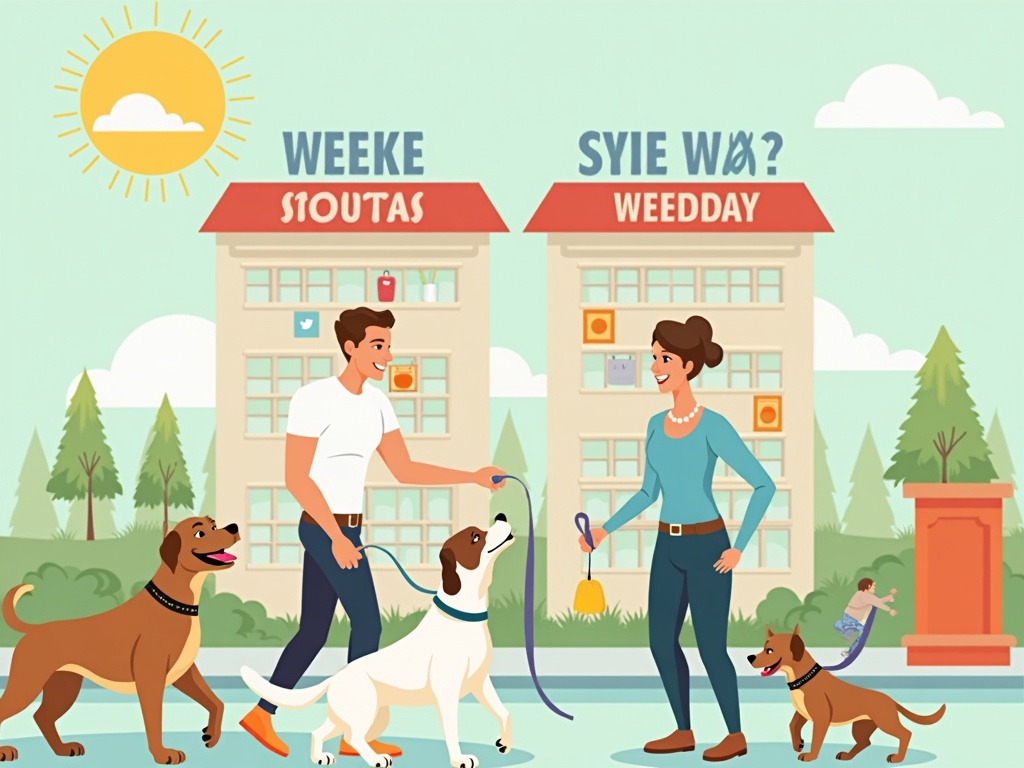Weekend Dog Schedule vs. Weekday: Balancing Your Dog's Needs With Your Lifestyle
Imagine this: it's 6 AM on a Tuesday. Your eyes flutter open to the insistent nudge of a wet nose and the hopeful thump of a tail against your bed. Contrast that with a lazy Saturday morning, sunlight streaming through the window, and you stirring whenever you please. Our dogs, creatures of habit, experience this shift in routine just as acutely as we do. So, how do we create a balanced schedule that caters to their needs while accommodating the contrasting rhythms of weekdays and weekends?
Understanding Your Dog's Needs: The Constant Factors
Regardless of whether it's a Monday or a Sunday, some canine needs remain constant. Ignoring these can lead to behavioral issues, anxiety, and a generally unhappy pup.
Daily Exercise: A Non-Negotiable
This is perhaps the most critical element. While the *typeof exercise might vary between weekdays and weekends, the *needfor physical activity doesn't. A brisk walk around the block might suffice on a busy weekday morning, but a long hike or a romp in the park will provide a more thorough workout. Remember to tailor the exercise to your dog's breed, age, and energy levels. A high-energy Border Collie will require significantly more activity than a senior Bulldog.
Consistent Feeding Times
Dogs thrive on predictability, and feeding times are a significant part of that. While the exact *timemay shift slightly between weekdays and weekends, maintaining a consistent *frequencyis key. If you feed your dog twice a day during the week, stick to that schedule on the weekend. This helps regulate their metabolism and prevent digestive upset.
Potty Breaks: A Matter of Urgency
Just like humans, dogs need regular opportunities to relieve themselves. Puppies and senior dogs especially need frequent potty breaks. While you might be able to stretch the time between walks on a relaxed weekend morning, ensure that your dog has access to the outdoors at least as often as they do during the week. Ignoring this can lead to accidents and frustration for both you and your furry friend.
Mental Stimulation: Keeping Their Minds Sharp
A bored dog is often a destructive dog. Providing mental stimulation is just as important as physical exercise. This can include puzzle toys, training sessions, or even just a new route for your daily walk. Weekends offer a great opportunity to engage in more complex mental exercises, such as teaching your dog a new trick or participating in a dog agility course.
The Weekday Hustle: Streamlining the Schedule
Weekdays are all about efficiency. Balancing work, errands, and other commitments often leaves little time for elaborate dog-centric activities. Here's how to make the most of your limited time:
Early Morning Walk: Kickstarting the Day
A short, brisk walk before work is crucial for both exercise and potty breaks. Even a 20-minute walk can make a big difference in your dog's overall mood and energy levels. Consider using a hands-free leash to multitask, such as listening to a podcast or making a phone call.
Mid-Day Relief: Hiring Help or Enlisting Friends
If your dog spends long hours alone during the day, consider hiring a dog walker or asking a friend or neighbor to let them out for a potty break. This not only prevents accidents but also provides much-needed social interaction and fresh air. Alternatively, doggy daycare can be a good option if you have the budget and your dog enjoys socializing with other dogs.
Evening Exercise: Winding Down After Work
Another walk in the evening is essential for burning off any pent-up energy. This walk can be longer and more leisurely than the morning walk, allowing your dog to sniff and explore their surroundings. Consider incorporating some training exercises into the walk to further stimulate their mind.
Quality Time: Cuddle Sessions and Playtime
Even on busy weekdays, make time for quality interaction with your dog. This could be as simple as a 15-minute cuddle session on the couch or a quick game of fetch in the backyard. These moments of connection strengthen your bond and help your dog feel loved and secure.
Weekend Freedom: Embracing Flexibility and Fun
Weekends offer the opportunity to deviate from the strict weekday schedule and indulge in more relaxed and engaging activities with your dog.
Longer Adventures: Hikes, Parks, and Playdates
Take advantage of the extra time to explore new environments with your dog. Go for a hike in a nearby forest, visit a dog-friendly park, or arrange a playdate with other dogs. These experiences provide both physical and mental stimulation, and they are a great way to bond with your furry friend.
Training and Enrichment: Building Skills and Confidence
Weekends are a perfect time to focus on training and enrichment activities. Work on teaching your dog new tricks, practice obedience commands, or enroll in a dog agility class. These activities not only improve your dog's skills but also boost their confidence and strengthen your bond.
Lazy Mornings: Allowing Extra Sleep (Within Reason)
While consistency is important, allowing for a slightly later wake-up time on weekends can be a welcome treat for both you and your dog. However, avoid drastically altering the schedule, as this can disrupt your dog's routine and lead to anxiety or accidents. A difference of an hour or two is usually manageable.
Socialization: Meeting New People and Dogs
Weekends are an excellent time to expose your dog to new people and dogs. Visit a dog-friendly café, attend a community event, or simply take a walk through a busy park. These experiences help socialize your dog and prevent them from becoming fearful or aggressive in new situations. (Remember to ensure your dog is ready and well trained for social interactions.)
Relaxation and Downtime: Unstructured Bonding
Don't overschedule your weekends! Remember to allow for plenty of downtime. This could involve cuddling on the couch, reading a book while your dog naps at your feet, or simply enjoying each other's company without any specific agenda. These moments of quiet connection are just as important as more structured activities.
Potential Pitfalls: Avoiding Weekend Schedule Mistakes
It's easy to fall into common traps when crafting a weekend dog schedule. Here's what to watch out for:
Over-Scheduling Weekend: Tired Dogs, Overly Stressed Owners
Resist the urge to cram every possible activity into your weekends. Over-scheduling can lead to exhaustion for both you and your dog. Remember to prioritize rest and relaxation.
Inconsistent Meal Times: Upset Stomachs
While a little flexibility is fine, drastically altering meal times on weekends can upset your dog's digestive system. Stick to a consistent feeding schedule as much as possible.
Ignoring Potty Break Need: Accidents Happen
Don't let your relaxed weekend schedule cause you to forget about your dog's potty break needs. Ensure that they have regular opportunities to relieve themselves. Especially before long trips and car rides.
Skipping Essential Exercise: Boredom and Destructive Behavior
Even if the weather is bad or you're feeling lazy, don't skip your dog's essential exercise. Find alternative ways to keep them active, such as indoor games or a short walk in the rain.
Creating a Sample Schedule: Tailoring to Your Dog and Lifestyle
Here's a sample schedule to get you started. Remember to adjust it to fit your dog's individual needs and your own lifestyle:
Sample Weekday Schedule
6:30 AM: Wake up, potty break, brisk 20-minute walk
7:00 AM: Breakfast
7:30 AM: Leave for work (dog walker visits mid-day if needed)
5:30 PM: Arrive home, potty break, 30-minute walk/playtime
6:30 PM: Dinner
7:00 PM: Cuddle time/training session
9:30 PM: Potty break
10:00 PM: Bedtime
Sample Weekend Schedule
8:00 AM: Wake up, potty break, leisurely walk in park
9:00 AM: Breakfast
10:00 AM: Training session/playdate with other dogs
12:00 PM: Lunch and relaxation
2:00 PM: Hike or other outdoor adventure
5:00 PM: Downtime, cuddle time
6:30 PM: Dinner
8:00 PM: Socialization (dog-friendly café) or quiet evening at home
9:30 PM: Potty break
10:00 PM: Bedtime
Conclusion: Happy Dog, Happy Life, Seven Days a Week
Creating a balanced weekend dog schedule versus a weekday one is about understanding your dog’s fundamental needs and finding creative ways to meet them within the constraints of your daily life. It involves a thoughtful blend of consistency and flexibility, ensuring that your furry friend receives the exercise, mental stimulation, and attention they need to thrive, regardless of the day of the week. So, embrace the challenge, tailor the routine, and enjoy the rewarding companionship of a happy and well-adjusted dog, every day of the year.


